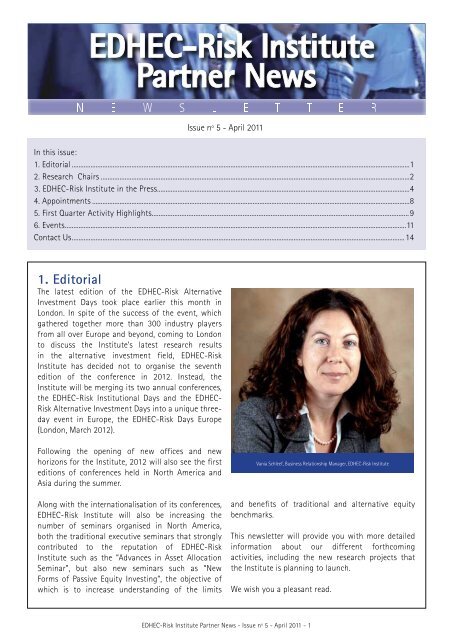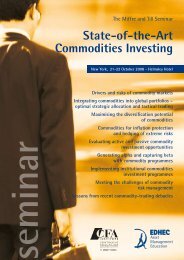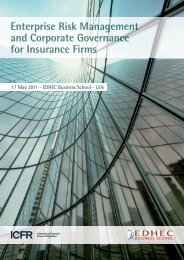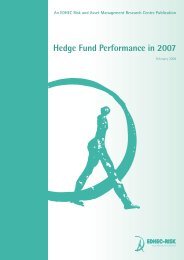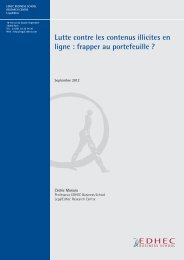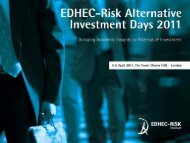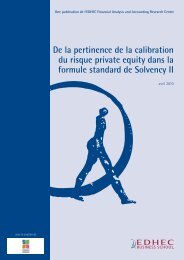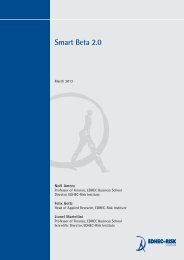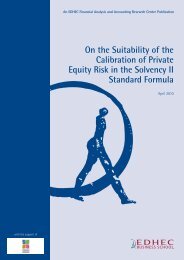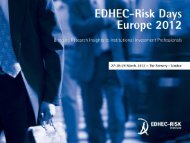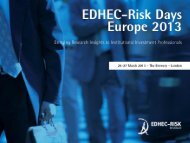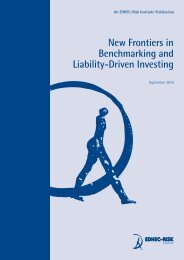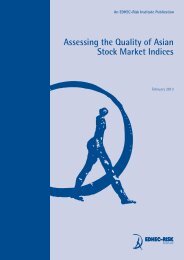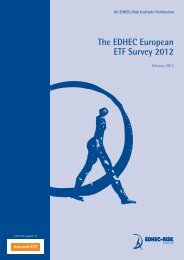You also want an ePaper? Increase the reach of your titles
YUMPU automatically turns print PDFs into web optimized ePapers that Google loves.
<strong>EDHEC</strong>-<strong>Risk</strong> <strong>Institute</strong><br />
<strong>Partner</strong> <strong>News</strong><br />
N E W S L E T T E R<br />
Issue nº 5 - April 2011<br />
In this issue:<br />
1. Editorial ......................................................................................................................................................................................................1<br />
2. Research Chairs .....................................................................................................................................................................................2<br />
3. <strong>EDHEC</strong>-<strong>Risk</strong> <strong>Institute</strong> in the Press....................................................................................................................................................4<br />
4. Appointments ..........................................................................................................................................................................................8<br />
5. First Quarter Activity Highlights...................................................................................................................................................9<br />
6. Events ........................................................................................................................................................................................................11<br />
Contact Us ...................................................................................................................................................................................................14<br />
1. Editorial<br />
The latest edition of the <strong>EDHEC</strong>-<strong>Risk</strong> Alternative<br />
Investment Days took place earlier this month in<br />
London. In spite of the success of the event, which<br />
gathered together more than 300 industry players<br />
from all over Europe and beyond, coming to London<br />
to discuss the <strong>Institute</strong>’s latest research results<br />
in the alternative investment field, <strong>EDHEC</strong>-<strong>Risk</strong><br />
<strong>Institute</strong> has decided not to organise the seventh<br />
edition of the conference in 2012. Instead, the<br />
<strong>Institute</strong> will be merging its two annual conferences,<br />
the <strong>EDHEC</strong>-<strong>Risk</strong> Institutional Days and the <strong>EDHEC</strong>-<br />
<strong>Risk</strong> Alternative Investment Days into a unique threeday<br />
event in Europe, the <strong>EDHEC</strong>-<strong>Risk</strong> Days Europe<br />
(London, March 2012).<br />
Following the opening of new offices and new<br />
horizons for the <strong>Institute</strong>, 2012 will also see the first<br />
editions of conferences held in North America and<br />
Asia during the summer.<br />
Along with the internationalisation of its conferences,<br />
<strong>EDHEC</strong>-<strong>Risk</strong> <strong>Institute</strong> will also be increasing the<br />
number of seminars organised in North America,<br />
both the traditional executive seminars that strongly<br />
contributed to the reputation of <strong>EDHEC</strong>-<strong>Risk</strong><br />
<strong>Institute</strong> such as the “Advances in Asset Allocation<br />
Seminar”, but also new seminars such as “New<br />
Forms of Passive Equity Investing”, the objective of<br />
which is to increase understanding of the limits<br />
Vania Schleef, Business Relationship Manager, <strong>EDHEC</strong>-<strong>Risk</strong> <strong>Institute</strong><br />
and benefits of traditional and alternative equity<br />
benchmarks.<br />
This newsletter will provide you with more detailed<br />
information about our different forthcoming<br />
activities, including the new research projects that<br />
the <strong>Institute</strong> is planning to launch.<br />
We wish you a pleasant read.<br />
<strong>EDHEC</strong>-<strong>Risk</strong> <strong>Institute</strong> <strong>Partner</strong> <strong>News</strong> - Issue nº 5 - April 2011 - 1
2. Research Chairs<br />
Currently eleven research chairs, associated with<br />
<strong>EDHEC</strong>-<strong>Risk</strong>’s six research programmes exploring<br />
interrelated aspects of asset allocation and risk<br />
management, are managed by <strong>EDHEC</strong>-<strong>Risk</strong> <strong>Institute</strong>.<br />
The research chairs involve close partnerships<br />
with their financial sponsors and a commitment<br />
from <strong>EDHEC</strong>-<strong>Risk</strong> to publishing related articles in<br />
international academic journals as well as to releasing<br />
the research results to the investment management<br />
profession through wide distribution of practitioneroriented<br />
publications and presentations at industry<br />
conferences. A selection of news concerning individual<br />
research chairs may be found below.<br />
Current Research Chair <strong>News</strong><br />
New research chair on Solvency II Benchmarks<br />
endowed by Russell Investments<br />
<strong>EDHEC</strong>-<strong>Risk</strong> <strong>Institute</strong> will be conducting research<br />
with the support of Russell Investments in order<br />
to design new benchmarks for European insurance<br />
companies that are representative of a dynamic<br />
allocation strategy between bonds and equities. The<br />
aim of the initiative is to enable all small- or mediumsized<br />
European insurance companies which do not<br />
have a full internal risk mitigation model to be able<br />
to avail of an objective academic reference in order to<br />
manage the risk of their equity investments.<br />
First year research project for Ontario Teachers’<br />
Pension Plan research chair underway<br />
Work has started on the first year research project<br />
of the Ontario Teachers’ Pension Plan “Advanced<br />
Investment Solutions for Liability Hedging for<br />
Inflation <strong>Risk</strong>“ research chair, under the supervision<br />
of Bernd Scherer, Professor of finance at <strong>EDHEC</strong><br />
Business School and member of <strong>EDHEC</strong>-<strong>Risk</strong> <strong>Institute</strong>.<br />
With $96.4 billion in net assets at December 31,<br />
2009, the Ontario Teachers’ Pension Plan is the<br />
largest single-profession pension plan in Canada.<br />
An independent organisation, it invests the pension<br />
fund’s assets and administers the pensions of 289,000<br />
active and retired teachers in Ontario.<br />
The theme of the first year research project is “Real<br />
Assets for Liability Relative Investors”. Industry wide<br />
pension funds all over the world tend to have made<br />
generous inflation indexed pension promises in the<br />
past. Given that real assets are often conjectured to<br />
offer a reduction in riskiness relative to a purchasing<br />
power metric, there is strong interest in the liability<br />
hedging properties of real assets. The conventional<br />
wisdom is that pension funds with real liabilities need<br />
to invest in assets that are positively correlated<br />
with inflation. As always, the conventional wisdom<br />
is incomplete. Pension funds with real liabilities<br />
need also to watch out for assets that are positively<br />
correlated with changes in real yields.<br />
The first year research will investigate the role of real<br />
assets for investors with real liabilities. While inflation<br />
and real rate sensitivities are both important and<br />
subject to the study, the ultimate question is whether<br />
real assets can help investors with real liabilities to<br />
improve the efficiency of their portfolios. The research<br />
will develop the necessary tools to investigate the role<br />
of real assets for pension funds with real liabilities.<br />
Latest findings from the Deutsche Bank and<br />
CACEIS research chairs reported recently in the<br />
Financial Times<br />
• Deutsche Bank “Asset-Liability Management<br />
Techniques for Sovereign Wealth Fund<br />
Management“ research chair<br />
In an article entitled “Sovereign wealth funds make<br />
presence felt” published in the FTfm on February<br />
21, Lionel Martellini, Scientific Director, and Vincent<br />
Milhau, Senior Research Engineer, at <strong>EDHEC</strong>-<strong>Risk</strong><br />
<strong>Institute</strong>, discuss the results of recent research<br />
conducted by <strong>EDHEC</strong>-<strong>Risk</strong> <strong>Institute</strong> as part of<br />
the Deutsche Bank “Asset-Liability Management<br />
Techniques for Sovereign Wealth Fund Management”<br />
research chair, which suggest that it is desirable to<br />
analyse the optimal investment policy of a sovereign<br />
wealth fund in an asset-liability management<br />
framework.<br />
The paper on which the article is based, “Asset-<br />
Liability Management Decisions for Sovereign<br />
Wealth Funds”, proposes a formal analysis of the<br />
optimal investment policy and risk management<br />
practices of sovereign wealth funds, which can be<br />
regarded as the extension to sovereign wealth funds<br />
of the liability-driven investing paradigm recently<br />
developed in the pension fund industry. This analysis<br />
has important potential implications in terms of<br />
the emergence of genuinely dedicated ALM and risk<br />
management solutions for sovereign wealth funds.<br />
<strong>EDHEC</strong>-<strong>Risk</strong> <strong>Institute</strong> <strong>Partner</strong> <strong>News</strong> - Issue nº 5 - April 2011 - 2
The full FTfm article may be consulted here.<br />
CACEIS “<strong>Risk</strong> and Regulation in the European<br />
Fund Management Industry” research chair<br />
The FTfm edition of March 28 reports the latest<br />
findings of the CACEIS “<strong>Risk</strong> and Regulation in the<br />
European Fund Management Industry” research chair<br />
in an article authored by Samuel Sender, applied<br />
research manager at <strong>EDHEC</strong>-<strong>Risk</strong> <strong>Institute</strong>. The article<br />
discusses the recent research conducted to examine<br />
how non-financial risks and failures have impacted<br />
the regulatory agenda in Europe and traced the<br />
management of liquidity, counterparty, compliance,<br />
misinformation, and other non-financial risks in<br />
the fund industry. This research gave rise to a paper<br />
entitled, “The European Fund Management Industry<br />
Needs a Better Grasp of Non-Financial <strong>Risk</strong>s”.<br />
The full FTfm article may be consulted here.<br />
A number of seminars to take place throughout<br />
Europe in April and May to present the latest<br />
results of the Ortec Finance, Rothschild & Cie, and<br />
AXA Investment Managers research chairs:<br />
• Exclusive presentation of the results of an <strong>EDHEC</strong>-<br />
<strong>Risk</strong> survey of European private wealth management<br />
practices organised in London with Ortec Finance<br />
As part of the Ortec Finance research chair on “Private<br />
Asset-Liability Management”, an exclusive seminar<br />
jointly organised by Ortec Finance and <strong>EDHEC</strong>-<br />
<strong>Risk</strong> <strong>Institute</strong> took place in London on April 20. The<br />
presentation, entitled “The Evolution of Value-Added<br />
in Private Wealth Management and the Asset-Liability<br />
Management Approach”, conducted by Felix Goltz,<br />
Head of Applied Research and Noël Amenc, Director,<br />
at <strong>EDHEC</strong>-<strong>Risk</strong> <strong>Institute</strong>, presented the results of the<br />
<strong>EDHEC</strong>-<strong>Risk</strong> European Private Wealth Management<br />
Survey and provided a unique opportunity to discuss<br />
the challenges in private wealth management and<br />
take a detailed look at the landscape of private wealth<br />
management in Europe.<br />
At the event, Ronald Janssen, Managing Director<br />
Private Wealth Management at Ortec Finance also<br />
presented the Private ALM solutions developed by his<br />
company for different client segments ranging from<br />
retail to private banks.<br />
• Special presentations to be held in Paris and London<br />
in May as part of the Rothschild & Cie research<br />
chair on “The Case for Inflation-Linked Corporate<br />
Bonds: Issuers’ and Investors’ Perspectives“<br />
At a special presentation entitled “How to Improve<br />
Corporate Debt Programmes with Inflation Linked<br />
Corporate Bonds” organised in Paris on 3 May and in<br />
London on 4 May, Lionel Martellini, Scientific Director<br />
at <strong>EDHEC</strong>-<strong>Risk</strong> <strong>Institute</strong>, will detail the recent <strong>EDHEC</strong>-<br />
<strong>Risk</strong> <strong>Institute</strong> research in this field and examine the<br />
following topics:<br />
- On the relevance of debt management<br />
- A simplified approach to debt management decisions<br />
- Introducing inflation-linked bonds<br />
- Numerical estimates of debt management benefits<br />
- Reconciling the needs of issuers and investors<br />
The main contribution of this research is to provide<br />
a joint quantitative analysis of capital-structure<br />
decisions and debt structure decisions within a<br />
standard continuous-time model in the presence of<br />
interest-rate and inflation risks. The principal findings<br />
are that debt management has an impact on capital<br />
structure and that an optimal debt structure can<br />
facilitate substantial increases in firm value. The<br />
research finds that a number of corporations would<br />
benefit from issuing inflation-linked bonds, bonds<br />
usually associated with sovereign states.<br />
• Exclusive seminar on accounting and sponsor<br />
risks in corporate pension plans organised in<br />
London, Paris and Amsterdam in May as part of<br />
the AXA Investment Managers “Regulation and<br />
Institutional Investment“ research chair<br />
At the seminar entitled, “The Elephant in the Room:<br />
Accounting and Sponsor <strong>Risk</strong>s in Corporate Pension<br />
Plans”, Samuel Sender, Applied Research Manager<br />
at <strong>EDHEC</strong>-<strong>Risk</strong> <strong>Institute</strong>, will present a major study<br />
conducted by <strong>EDHEC</strong>-<strong>Risk</strong> <strong>Institute</strong> analysing how<br />
pension funds and sponsors manage the main risks<br />
they face and how institutional constraints influence<br />
the investment strategy of sponsors and pension<br />
funds.<br />
Erwan Boscher, Head of Pension Solutions at AXA<br />
Investment Managers will also be making a presentation<br />
at the event on the topic of “Practical Insights into<br />
Pension Fund Regulation and Consequences for<br />
Investors”.<br />
<strong>EDHEC</strong>-<strong>Risk</strong> <strong>Institute</strong> <strong>Partner</strong> <strong>News</strong> - Issue nº 5 - April 2011 - 3
The seminars will take place on 16 May in Paris, 17<br />
May in Amsterdam and 18 May in London.<br />
Other Research Project <strong>News</strong><br />
<strong>EDHEC</strong>-<strong>Risk</strong> <strong>Institute</strong> receives new support for<br />
three major research projects in Asia<br />
CME Group, Eurex and Société Générale Corporate<br />
& Investment Banking have signed partnership<br />
agreements with <strong>EDHEC</strong> <strong>Risk</strong> <strong>Institute</strong>–Asia and joined<br />
Amundi ETF, AXA Investment Managers, Deutsche<br />
Bank, and the Monetary Authority of Singapore<br />
in their support of <strong>EDHEC</strong>-<strong>Risk</strong> <strong>Institute</strong>’s newly<br />
established Asian platform.<br />
Chicago-based CME Group is sponsoring a research<br />
project entitled “Exploring the Commodity Futures<br />
<strong>Risk</strong> Premium: Implications for Asset Allocation and<br />
Regulation”. The research will build on previous work<br />
by Professor Joëlle Miffre which showed that a longshort<br />
dynamic approach based on the positions of<br />
hedgers and speculators and taking into account<br />
backwardation and contango was particularly apt at<br />
capturing the hedging pressure-based commodity<br />
futures risk premium. The project will explore the<br />
conditional correlations between the commodity risk<br />
premium and the returns of traditional assets over the<br />
long term to examine the diversification and extremerisk<br />
hedging potential of commodity futures as an<br />
asset class. It will also look at the possible influence<br />
of long-short speculators and long-only index traders<br />
on commodity markets to bring research-based facts<br />
to the current debate on the link between commodity<br />
market “financialisation” and price formation.<br />
The <strong>Institute</strong> will be conducting new research looking<br />
at “The Benefits of Volatility Derivatives in Equity<br />
Portfolio Management” with the support of Frankfurtbased<br />
Eurex. The research project’s emphasis will be<br />
on optimising access to the equity risk premium while<br />
controlling for downside risk. It will be co-managed<br />
by Professor Stoyan Stoyanov, Head of Research<br />
at <strong>EDHEC</strong> <strong>Risk</strong> <strong>Institute</strong>–Asia and Professor Lionel<br />
Martellini, Scientific Director of <strong>EDHEC</strong>-<strong>Risk</strong> <strong>Institute</strong>.<br />
that documented the relevance of structured<br />
products in institutional investment, the study will<br />
develop a framework for the comparative analysis of<br />
various forms of allocation to equities, including new<br />
structured forms of investment management, from<br />
an institutional asset allocation and risk management<br />
standpoint. The project will be led by Professor<br />
Stoyanov.<br />
3. <strong>EDHEC</strong>-<strong>Risk</strong> <strong>Institute</strong><br />
in the Press<br />
A selection of recent articles from the international<br />
business and specialised press featuring <strong>EDHEC</strong>-<strong>Risk</strong><br />
<strong>Institute</strong>’s research may be found below.<br />
<strong>Risk</strong> management:<br />
• IPE (January 2011)<br />
Beta-zero fees<br />
“(…) Bernd Scherer tells Martin Steward that asset<br />
managers should take a good look at – and possibly<br />
hedge – the market risk embedded in their fees. How<br />
might that change the relationship with clients? (...)<br />
Many asset management companies went bust thanks<br />
to the financial crisis. No wonder many more are<br />
now taking a closer look at their key business risks.<br />
“Sometimes it takes a catalyst to create awareness –<br />
and P&L is an excellent teacher,” says Bernd Scherer,<br />
professor of finance at the <strong>EDHEC</strong> Business School and<br />
former Morgan Stanley managing director. Scherer’s<br />
attention is particularly focused on the pure market<br />
exposure risk that asset managers run via the assetbased<br />
fees that generate the bulk of their revenues.<br />
He feels this is massively overlooked by the industry,<br />
which assumes that its key risks are operational. But<br />
if an asset manager charges fees as a percentage of<br />
assets under management, and if those assets fall in<br />
line with the market, it stands to reason that revenues<br />
will fall in line with the market. (…)”<br />
Copyright IPE<br />
Société Générale Corporate & Investment<br />
Banking is supporting research into “Structured<br />
Equity Investment Strategies for Long-Term Asian<br />
Investors”. Building on earlier work by the <strong>Institute</strong><br />
<strong>EDHEC</strong>-<strong>Risk</strong> <strong>Institute</strong> <strong>Partner</strong> <strong>News</strong> - Issue nº 5 - April 2011 - 4
Private equity:<br />
• Financial Times (17/01/2011)<br />
Big buy-out firms poor performers<br />
“(...) The world’s largest private equity groups deliver<br />
the worst returns for investors, according to analysis<br />
of 7,500 investments over the past 40 years. The<br />
research, conducted by the <strong>EDHEC</strong>-<strong>Risk</strong> <strong>Institute</strong>,<br />
an arm of France’s <strong>EDHEC</strong> Business School, found<br />
firms that hold a large number of investments<br />
simultaneously “underperform substantially”. The<br />
study, Giants at the Gate, also found returns from<br />
private equity investment in emerging markets are<br />
significantly below those in developed markets,<br />
potentially undermining the industry’s ongoing push<br />
into the fast-growing Asian markets. The report’s key<br />
finding was that “the scale of private equity firms is<br />
a significant and consistent driver of returns. Small<br />
investments outperform large.” <strong>EDHEC</strong> ranked the<br />
data in terms of the number of investments held<br />
simultaneously, a proxy for the size of a private<br />
equity firm. (...) <strong>EDHEC</strong> concluded, as private equity<br />
firms become bigger, communication becomes<br />
difficult and senior managers have less time for each<br />
portfolio company. “It is possible that the quality of<br />
the communication and the attention provided to [a<br />
given] investment may be lower, ultimately leading to<br />
poorer performance,” it said. (...)“<br />
Copyright Financial Times Fund Management<br />
Regulation:<br />
(investor protection) objectives were talked about for<br />
(Ucits), but regulators haven’t put their words into<br />
action,” he says. “(Current) regulations have huge<br />
holes in their safety nets.” In the study, available in<br />
our research archive, <strong>EDHEC</strong> says making risks clearer<br />
to investors would force managers into becoming<br />
more accountable. Mr Sender says the current<br />
reporting requirements under the Ucits regime are<br />
not sufficient to keep investors well informed. (...)”<br />
Copyright Ignites Europe<br />
• Financial Times (30/01/2011)<br />
Insurers gear up for new charges<br />
“(...) New regulations governing the European insurance<br />
industry could lead to a wave of selling of corporate<br />
bonds and equities, commentators believe. (...) The<br />
Solvency II directive, which sets new requirements on<br />
capital adequacy and risk management for insurers,<br />
aims to change investment behaviour by imposing<br />
varying capital charges on assets. Equities will need<br />
to be backed by reserves of 30-40 per cent, while<br />
European sovereign debt is deemed risk free. (...)<br />
Samuel Sender of the <strong>EDHEC</strong>-<strong>Risk</strong> <strong>Institute</strong> added:<br />
“Corporate bonds will not be used really to hedge<br />
liabilities. If you are holding corporate bonds you are<br />
taking an extra risk.” (...) Mr Sender added: “Insurance<br />
companies invest in low risk hedge funds to diversify.<br />
If you have a higher capital charge, regulation almost<br />
prevents you from doing that. You will have a shift<br />
away from less risky investments.” (...)”<br />
Copyright Financial Times Fund Management<br />
• Ignites Europe (19/01/2011)<br />
Ucits framework riddled with danger: study<br />
“(...) The Ucits regime is riddled with dangerous holes<br />
that pose a safety risk to investors, says the author<br />
of a new study on the European fund industry. Ucits<br />
funds have become increasingly sophisticated over<br />
the past few years, and that fact has slipped the<br />
attention of EU policymakers, warns Samuel Sender,<br />
applied research manager at <strong>EDHEC</strong>-<strong>Risk</strong> <strong>Institute</strong>. The<br />
emergence of counterparty, liquidity and sub-custody<br />
risks have not been followed up with adequate rules<br />
to protect investors, Mr Sender believes. “A lot of<br />
• Financial Times (28/03/2011)<br />
Action needed to shield investors from Ucits risk<br />
Article by Samuel Sender, applied research manager at<br />
<strong>EDHEC</strong>-<strong>Risk</strong> <strong>Institute</strong><br />
“(...) Non-financial risks have been increasing since<br />
Ucits investment funds were first set up, but European<br />
authorities and investment professionals failed to<br />
study the impact of these risks when they facilitated<br />
the evolution of the funds. In recent research<br />
conducted by <strong>EDHEC</strong>-<strong>Risk</strong> <strong>Institute</strong> as part of the “<strong>Risk</strong><br />
and Regulation in the European Fund Management<br />
Industry” research chair in partnership with Caceis,<br />
<strong>EDHEC</strong>-<strong>Risk</strong> <strong>Institute</strong> <strong>Partner</strong> <strong>News</strong> - Issue nº 5 - April 2011 - 5
we looked at how non-financial risks and failures<br />
have impacted the regulatory agenda in Europe and<br />
traced the management of liquidity, counterparty,<br />
compliance, misinformation, and other non-financial<br />
risks in the fund industry. There are several reasons<br />
for the increase in non-financial risks in investment<br />
funds. One is the growing sophistication of the<br />
transactions and financial instruments involved. A<br />
second is the attempt to obtain returns above the<br />
risk-free rate from non-traditional assets (ie not<br />
stocks and bonds). A third is regulatory developments<br />
such as the eligible assets directive and the<br />
possibilities for leverage in sophisticated Ucits. (...)“<br />
Copyright Financial Times Fund Management<br />
Sovereign wealth funds:<br />
worth $4,000bn – or slightly more than twice the<br />
estimated size of the hedge fund industry. Post-crisis<br />
estimates suggest the total will rise to $7,000bn by<br />
the end of the decade. This rapid growth of sovereign<br />
wealth funds and its implications poses a series of<br />
challenges for the international financial markets, and<br />
also for sovereign states. In particular, an outstanding<br />
challenge is to improve our understanding of optimal<br />
investment policy and risk management practices for<br />
sovereign wealth funds. Recent academic research<br />
conducted by <strong>EDHEC</strong>-<strong>Risk</strong> <strong>Institute</strong> in co-operation<br />
with Deutsche Bank suggests it is desirable to analyse<br />
the optimal investment policy of a sovereign wealth<br />
fund in an asset-liability management framework. (...)“<br />
Copyright Financial Times Fund Management<br />
Hedge fund indices:<br />
• IPE Asia (03/02/2011)<br />
You need three different portfolios<br />
Article by Professor Lionel Martellini, scientific<br />
director of the <strong>EDHEC</strong>-<strong>Risk</strong> <strong>Institute</strong>, and Dr Vincent<br />
Milhau, research engineer<br />
“(…) An SWF’s investment strategy should include three<br />
building blocks. (The proportion of assets allocated to<br />
each of the portfolios will vary dynamically depending<br />
on each country’s changing circumstances.) Firstly<br />
there should be a performance-seeking portfolio (PSP).<br />
Typically this will invest heavily in equities. Secondly,<br />
SWFs should have an endowment-hedging portfolio<br />
(EHP) to protect against variations in revenue. Thirdly,<br />
a liability-hedging portfolio (LHP) is needed, to invest<br />
in bonds for interest rate hedging, and in assets that<br />
protect against inflation if liabilities are likely to<br />
increase in line with prices. (…)“<br />
Copyright IPE Asia<br />
• Financial Times (21/02/2011)<br />
Sovereign wealth funds make presence felt<br />
Article by Lionel Martellini, scientific director at<br />
<strong>EDHEC</strong>-<strong>Risk</strong> <strong>Institute</strong>, and Vincent Milhau, senior<br />
research engineer<br />
“(...) It is now widely recognised that sovereign funds<br />
are a dominant force on international financial<br />
markets. Some estimates say they manage assets<br />
• Financial <strong>News</strong> (07/02/2011)<br />
<strong>EDHEC</strong> corrects distortion of fund performance<br />
figures<br />
“(...) <strong>EDHEC</strong>-<strong>Risk</strong> <strong>Institute</strong>, one of the leading European<br />
business schools, has come up with a new way of<br />
correcting misleading hedge fund performance<br />
figures. It has highlighted three ways in which<br />
hedge fund performance in non-investable indices<br />
have been flattered. One of the most common is the<br />
“survivorship bias”, where poorly performing funds<br />
simply stop reporting numbers. Another is when funds<br />
that have closed down or blown up are then pulled<br />
from a database. The third is when a fund that has<br />
done well is included in the database retrospectively.<br />
(...) <strong>EDHEC</strong> proposes comparing the monthly returns<br />
of the <strong>EDHEC</strong> (non-investable) composite indices and<br />
the average monthly returns of a set of investable<br />
indices from a range of providers for each underlying<br />
strategy. The model consists of regressing the returns<br />
of the non-investable <strong>EDHEC</strong>-<strong>Risk</strong> Alternative Index<br />
on the returns of the corresponding investable<br />
indices. (...)“<br />
Copyright Financial <strong>News</strong><br />
<strong>EDHEC</strong>-<strong>Risk</strong> <strong>Institute</strong> <strong>Partner</strong> <strong>News</strong> - Issue nº 5 - April 2011 - 6
• Financial Times (07/03/2011)<br />
Hedge fund indices’ accuracy in question<br />
“(...) Industry-wide performance indices are an<br />
excellent recruiting sergeant for the hedge fund<br />
industry. These indices, published by a number of<br />
data providers, typically boast attractive annualised<br />
double-digit returns with scarcely a down year, the<br />
industry’s annus horribilis of 2008 excepted. But how<br />
confident can investors be that these indices provide a<br />
true reflection of the returns of the underlying hedge<br />
fund industry? The <strong>EDHEC</strong>-<strong>Risk</strong> <strong>Institute</strong>, an arm of<br />
France-based <strong>EDHEC</strong> Business School, stirred the pot<br />
recently when it stated that “the performance of multistrategy<br />
indices whose portfolios included illiquid [or<br />
less liquid] strategies was extraordinarily overstated<br />
after mid-2008”. Felix Goltz, head of applied research<br />
at <strong>EDHEC</strong> added: “It is more and more difficult to<br />
justify the use of non-investable composite indices<br />
as benchmarks unless we can suggest a practical and<br />
easy-to-implement solution that could substantially<br />
reduce the biases that overstate their performance,<br />
especially in periods of market stress.” (...)“<br />
Copyright Financial Times Fund Management<br />
Short selling ban:<br />
• Global Pensions (09/03/2011)<br />
European Parliament backs naked short selling ban<br />
“(...) The moratorium applies to shorting sovereign<br />
debt, where sellers do not simultaneously hold<br />
offsetting, long positions in that debt. National<br />
regulators fear the activity could cause mispricing<br />
and, in extreme cases, downwards price spirals, the<br />
EC says. But <strong>EDHEC</strong> said intermediaries and regulators<br />
will be unable to verify long positions the CDS hedge<br />
is assumed to cover. A ban makes it more difficult for<br />
countries to manage interest rate risk on their debt<br />
actively, because counterparties would be barred from<br />
hedging the country risk of interest rate swaps they<br />
had entered into, <strong>EDHEC</strong> added, saying “such active<br />
management of the yield curve is a major component<br />
in the optimisation of the cost of public debt.“ It<br />
added that defining “naked sales“ too strictly will<br />
make it impossible for financiers to hedge the default<br />
risk of public or private entities they supported, where<br />
those entities did business with sovereign nations.<br />
“At a time when public-private partnerships and<br />
private financing of public infrastructure projects<br />
are considered one of the drivers of global growth,<br />
making it harder to manage country risk may at the<br />
very least increase the costs of these partnerships and<br />
this financing,“ <strong>EDHEC</strong> wrote. (...)“<br />
Copyright Global Pensions<br />
• Financial <strong>News</strong> (09/03/2011)<br />
Fears grow over CDS restrictions<br />
“(...) In a statement issued yesterday, <strong>EDHEC</strong> <strong>Risk</strong><br />
<strong>Institute</strong>, an academic think tank, added that the<br />
proposed rules could deter companies from financing<br />
major projects in foreign countries or entering into<br />
contracts with governments as they would not be able<br />
to hedge the default risk of their counterparties. (...)“<br />
Copyright Financial <strong>News</strong><br />
<strong>EDHEC</strong>-<strong>Risk</strong> <strong>Institute</strong><br />
• <strong>Risk</strong>.net (25/01/2011)<br />
<strong>EDHEC</strong>-<strong>Risk</strong> <strong>Institute</strong> makes Asian debut in<br />
Singapore<br />
“(...) <strong>EDHEC</strong>-<strong>Risk</strong> <strong>Institute</strong> has opened its first Asian<br />
office in Singapore and named Frederic Ducoulombier<br />
the director of the <strong>EDHEC</strong>-<strong>Risk</strong> <strong>Institute</strong> Asia, heading<br />
the operations and business development of the risk<br />
research institution in the region. Ducoulombier will<br />
be based in Singapore and report to London-based<br />
Noel Amenc, director of <strong>EDHEC</strong>-<strong>Risk</strong>. The institute is<br />
planning to conduct research on the uses of volatility<br />
derivatives in equity portfolio management and also<br />
volatility indicators for Asia. it will also research<br />
extreme risk measures for hedge funds and volatility<br />
risk exposure of hedge funds. Amenc said the growing<br />
influence of Asian markets and investors requires more<br />
industry-relevant academic research be performed in<br />
the region. (...)“<br />
Copyright Incisive Media Investments Limited<br />
<strong>EDHEC</strong>-<strong>Risk</strong> <strong>Institute</strong> <strong>Partner</strong> <strong>News</strong> - Issue nº 5 - April 2011 - 7
• IPE (16/03/2011)<br />
<strong>EDHEC</strong> unveils <strong>Risk</strong> Indices & Benchmarks spin-off<br />
“(…) <strong>EDHEC</strong> Business School has launched a company<br />
to promote its indices, hoping its unique weighting<br />
methodology will appeal to passive investors. <strong>EDHEC</strong>-<br />
<strong>Risk</strong> Indices & Benchmarks (ERIB) will be a separate<br />
entity from the business school, allowing it to retain<br />
its independence. Talking exclusively to IPE, professor<br />
Noël Amenc, director of <strong>EDHEC</strong>-<strong>Risk</strong> <strong>Institute</strong> and<br />
chairman of the new group, said that while patenting<br />
research was not their main interest, it was to their<br />
benefit to reap the rewards of the school’s established<br />
brand name and the research conducted. Amenc said<br />
other indices applied an “ad-hoc“ approach and that<br />
the academic research conducted by <strong>EDHEC</strong> as a<br />
foundation for the benchmarks would serve investors<br />
well. (…)“<br />
Copyright IPE<br />
• Global Money Management (12/04/2011)<br />
<strong>EDHEC</strong> Opens In London<br />
”(...) <strong>EDHEC</strong>-<strong>Risk</strong> <strong>Institute</strong>, the premier European<br />
centre for financial research and its application to<br />
the industry, has opened a London office to mark<br />
the launch of <strong>EDHEC</strong> <strong>Risk</strong> <strong>Institute</strong>–Europe. With<br />
the support of the financial Industry, <strong>EDHEC</strong> <strong>Risk</strong><br />
<strong>Institute</strong>–Europe aims to continue to be the leading<br />
academic institution fostering innovation and high<br />
professional standards in the investment industry.<br />
The opening of the London office follows the<br />
launch of <strong>EDHEC</strong> <strong>Risk</strong> <strong>Institute</strong>–Asia in Singapore in<br />
January. Professor Noël Amenc, director of <strong>EDHEC</strong>-<br />
<strong>Risk</strong> <strong>Institute</strong>, said <strong>EDHEC</strong> <strong>Risk</strong> <strong>Institute</strong>–Europe “will<br />
serve as a platform for the continued generation<br />
and dissemination of academic insights into the<br />
key investment management issues of practical<br />
relevance to European investors and financial<br />
institutions.” He added that over the past 10 years,<br />
in partnership with progressive financial institutions,<br />
“our team of professors, engineers and support staff<br />
have implemented research programmes and chairs<br />
focusing on asset allocation and risk management.”<br />
The benefit of a London presence brings the firm closer<br />
to many of the financial institutions it collaborates<br />
with and it will aim to further strengthen its record<br />
of pursuing academic excellence, he continued. (…)“<br />
Copyright Global Money Management (Institutional<br />
Investor)<br />
4. Appointments<br />
<strong>EDHEC</strong>-<strong>Risk</strong> <strong>Institute</strong> is pleased to announce the<br />
following appointments. Three new distinguished<br />
members to its international advisory board:<br />
• Mr. Tomas Franzén, Chief Investment Strategist,<br />
AP2 - Andra AP-fonden<br />
Tomas Franzén currently holds a position as Chief<br />
Investment Strategist at the Second Swedish National<br />
Pension Fund – AP2, in Gothenburg. AP2 is one of<br />
four buffer-funds within the recently reformed<br />
Swedish national pay-as-you-go pension system.<br />
As Chief Investment Strategist, Tomas is responsible<br />
for issues related to Investment Policy and Strategic<br />
Asset Allocation. AP2 has USD 30bn in assets under<br />
management invested in a broad-based global<br />
portfolio of public and private assets. Tomas is a<br />
member of the Executive Committee at AP2.<br />
• Mr. Jaap van Dam, Managing Director Investment<br />
Strategy, PGGM<br />
As Managing Director Strategy, Jaap van Dam is<br />
responsible for the Strategic Asset Allocation and the<br />
Investment Plan for the clients of PGGM Investments.<br />
He is member of the ALM, Investment and Allocation<br />
Committees of PGGM Investments and member of the<br />
Front Office Management Team. Jaap is a member of the<br />
ICPM Research Committee and the Investment Board of<br />
the Dutch Society of Industry Pension funds (VB).<br />
<strong>EDHEC</strong>-<strong>Risk</strong> <strong>Institute</strong> <strong>Partner</strong> <strong>News</strong> - Issue nº 5 - April 2011 - 8
• Mr. Stuart Lewis, Chief Credit Officer and Deputy<br />
Chief <strong>Risk</strong> Officer, Deutsche Bank<br />
Stuart Lewis was appointed Chief Credit Officer and<br />
Deputy Chief <strong>Risk</strong> Officer in December 2006. He joined<br />
Deutsche Bank in June 1996. Before assuming his<br />
current function, Stuart held the role of Global Head<br />
of Loan Exposure Management Group (LEMG) since<br />
July 2005. Prior to that, from July 2003, Stuart headed<br />
the European function of LEMG. Stuart’s history with<br />
Deutsche Bank includes the roles of Deputy Chief<br />
Credit Officer of CIB within Credit <strong>Risk</strong> Management<br />
and a member of the Group <strong>Risk</strong> Committee. Stuart<br />
has previously been Chief Credit Officer for Asia and a<br />
member of the Bank’s Group Credit Committee from<br />
1996 to 1998.<br />
• Frank Fabozzi, acclaimed author and eminent<br />
international expert, to join <strong>EDHEC</strong> in August<br />
2011 as Professor of Finance based in New York<br />
Analysis, and Operations Research. He has been the<br />
Editor of the Journal of Portfolio Management for<br />
twenty-five years and sits on the editorial or advisory<br />
boards of seven other journals.<br />
He co-developed a model for the valuation of interest<br />
rate sensitive claims that is used by major financial<br />
institutions and, in 2002, was inducted into the Fixed<br />
Income Analysts Society’s Hall of Fame for his lifetime<br />
contributions to the advancement of fixed-income<br />
analysis and portfolio management.<br />
He has edited or authored over one hundred finance<br />
books, three of which were co-authored with the late<br />
Franco Modigliani and two of which co-edited with<br />
Harry Markowitz. He is the eponymous manager of an<br />
authoritative series of finance books for practitioners<br />
and academics. In 2007, the CFA <strong>Institute</strong> honoured<br />
him with the C. Stewart Sheppard Award for his<br />
outstanding contribution to the education of<br />
professional investors.<br />
He advises financial institutions and US government<br />
agencies and is on the board of directors of the<br />
BlackRock family of closed-end funds.<br />
He holds a MA and PhD in Economics from the City<br />
University of New York and is a Chartered Financial<br />
Analyst and a Certified Public Accountant.<br />
<strong>EDHEC</strong>-<strong>Risk</strong> <strong>Institute</strong> is very pleased to announce that<br />
Professor Frank Fabozzi will be joining <strong>EDHEC</strong> Business<br />
School in August 2011. Frank Fabozzi is currently<br />
Professor in the Practice of Finance and Becton Fellow<br />
at the Yale School of Management, having previously<br />
been Visiting Professor of Finance and Accounting at<br />
the MIT Sloan School of Management.<br />
His recent research focuses on quantitative finance<br />
and investment management, with emphasis on<br />
mortgage- and asset-backed securities and structured<br />
products, and risk measurement, modelling, and<br />
management. He has published close to two hundred<br />
scientific articles and his research has appeared in<br />
leading journals, including Econometric Theory, the<br />
Journal of Economic Dynamics and Control, the Journal<br />
of Finance, the Journal of Financial and Quantitative<br />
5. First Quarter Activity<br />
Highlights<br />
Events<br />
<strong>EDHEC</strong>-<strong>Risk</strong> <strong>Institute</strong> organised a number of<br />
conferences and seminars in Europe, North America<br />
and Asia during the first quarter of 2011, details of<br />
which may be found below:<br />
Event Name Event Type Venue Date<br />
<strong>EDHEC</strong>-<strong>Risk</strong> Alternative Investment<br />
Days 2011<br />
Conference London 05/04/11-06/04/11<br />
Advances in Asset Allocation Seminar New York<br />
Singapore<br />
<strong>EDHEC</strong>-<strong>Risk</strong> Indices & Benchmarks<br />
Seminar on Equity Indices<br />
Paradigm Shifts in Investment<br />
Management: Why <strong>Risk</strong> Management<br />
Adds Value in Asset Management<br />
"How to (or how not to) manage<br />
money: New approaches for portfolio<br />
construction" presentation<br />
08/03/11-10/03/11<br />
29/03/11-31/03/11<br />
Seminar New York 07/02/11<br />
Seminar<br />
New York<br />
Boston<br />
08/02/11<br />
09/02/11<br />
Seminar London 08/03/11<br />
<strong>EDHEC</strong>-<strong>Risk</strong> <strong>Institute</strong> <strong>Partner</strong> <strong>News</strong> - Issue nº 5 - April 2011 - 9
Selected Research Dissemination<br />
Key research information disseminated to over 750,000<br />
practitioners by <strong>EDHEC</strong>-<strong>Risk</strong> <strong>Institute</strong> through both<br />
regular newsletters and dedicated e-mailings during<br />
the same period includes:<br />
January<br />
• The European Fund Management Industry<br />
Needs a Better Grasp of Non-financial <strong>Risk</strong>s<br />
CACEIS “<strong>Risk</strong> and Regulation in the European Fund<br />
Management Industry“ research chair publication<br />
This publication looks at how non-financial risks<br />
and failures have impacted the regulatory agenda<br />
in Europe and traces the management of liquidity,<br />
counterparty, compliance, misinformation, and other<br />
financial risks in the fund industry.<br />
• Giants at the Gate: On the Cross-Section of<br />
Private Equity Investment Returns<br />
<strong>EDHEC</strong>-<strong>Risk</strong> working paper<br />
This paper examines the determinants of private<br />
equity returns using a newly constructed worldwide<br />
database of 7,500 investments made over forty years.<br />
• Media and Investment Management<br />
<strong>EDHEC</strong>-<strong>Risk</strong> working paper<br />
This paper measures the differential impact of<br />
alternative media outlets by classifying news items<br />
about equity hedge funds over 1999 to 2008 into<br />
three source groups and applying a textual analysis to<br />
news items to uncover media biases.<br />
• <strong>Risk</strong> Control through Dynamic Core-Satellite<br />
Portfolios of ETFs: Applications to Absolute<br />
Return Funds and Tactical Asset Allocation<br />
Amundi ETF “Core-Satellite and ETF Investment”<br />
research chair publication<br />
This publication draws on dynamic risk-budgeting<br />
techniques to emphasise the importance of risk<br />
management when decisions to allocate to ETFs are<br />
made. A revisited version of this working paper was<br />
published in the Fall 2010 issue of the Journal of<br />
Alternative Investments.<br />
• Adoption of Green Investing by Institutional<br />
Investors: A European Survey<br />
<strong>EDHEC</strong>-<strong>Risk</strong> publication<br />
This survey reviews the concept of green investing and<br />
reports the results of a European survey of investment<br />
management professionals with the objective of<br />
providing background on industry and academic<br />
research into green investing and assessing the views<br />
and uses of green investing.<br />
February<br />
• Option Pricing and Hedging in the Presence of<br />
Basis <strong>Risk</strong><br />
French Banking Federation (FBF) “Structured Products<br />
and Derivatives” research chair publication<br />
This document addresses the problem of option<br />
hedging and pricing when a futures contract, written<br />
either on the underlying asset or on some imperfectly<br />
correlated substitute for the underlying asset, is used<br />
in the dynamic replication of the option payoff.<br />
• Index-Exciting CAViaR: A New Empirical Time-<br />
Varying <strong>Risk</strong> Model<br />
<strong>EDHEC</strong>-<strong>Risk</strong> working paper<br />
This paper explores more flexible CAViaR models<br />
that allow VaR prediction to depend upon a richer<br />
information set involving returns on an index.<br />
• Alternative Measurement Bases in Pension<br />
Accounting: A Simulation Analysis<br />
<strong>EDHEC</strong>-<strong>Risk</strong> working paper<br />
This paper explores the financial statement<br />
implications of alternative measurement bases<br />
underlying defined benefit pension accounting rules<br />
via a simulation analysis.<br />
• Asset-Liability Management Decisions for<br />
Sovereign Wealth Funds<br />
Deutsche Bank “Asset-Liability Management<br />
Techniques for Sovereign Wealth Fund Management”<br />
research chair publication<br />
This publication proposes a quantitative dynamic<br />
asset allocation framework for sovereign wealth<br />
funds, modelled as large long-term investors that<br />
manage fluctuating revenues typically emanating<br />
from budget or trade surpluses in the presence of<br />
stochastic investment opportunity sets.<br />
• Bankers, Markets & Investors November/<br />
December 2010 issue<br />
A special issue of Bankers, Markets & Investors<br />
produced on the occasion of the <strong>EDHEC</strong>-<strong>Risk</strong><br />
Institutional Days 2010 in Monaco and featuring<br />
research by <strong>EDHEC</strong>-<strong>Risk</strong> <strong>Institute</strong> on the following<br />
topics: Towards the Design of improved Forms of<br />
Target-Date Funds, Why Pension Funds should Favour<br />
<strong>EDHEC</strong>-<strong>Risk</strong> <strong>Institute</strong> <strong>Partner</strong> <strong>News</strong> - Issue nº 5 - April 2011 - 10
Rule-Based Strategies over Discretionary Ones,<br />
Macroeconomic <strong>Risk</strong> Management for Oil Stabilization<br />
Funds in GCC Countries, French Corporate Social<br />
Responsibility: Which Dimension Pays More?, The<br />
State of Development of the European ETF Industry<br />
after a Decade: Evidence from the Demand Side.<br />
March<br />
• The Elephant in the Room: Accounting and<br />
Sponsor <strong>Risk</strong>s in Corporate Pension Plans<br />
AXA Investment Managers “Regulation and<br />
Institutional Investment“ research chair publication<br />
A survey of corporate pension funds, their sponsors,<br />
and advisers, assessing how sponsors manage<br />
pension risk and how pension funds manage sponsor<br />
risk.<br />
• Never the Twain Shall Meet? Addressing<br />
the Disconnect between Banks’ Financial and<br />
Regulatory Reporting<br />
<strong>EDHEC</strong> Financial Analysis and Accounting Research<br />
Centre position paper<br />
This paper reviews the arguments for and against<br />
the decoupling of capital ratio calculations based on<br />
IFRS from those based on Basel II.<br />
• <strong>Risk</strong> Reduction in Style Rotation<br />
<strong>EDHEC</strong>-<strong>Risk</strong> working paper<br />
This paper investigates the potential improvement<br />
in the implementation of style rotation strategies by<br />
techniques addressing estimation errors.<br />
and Passive Investment will be the highlights of the<br />
first two days of the event, while the third day will be<br />
dedicated to alternative investments. The 2012 <strong>EDHEC</strong>-<br />
<strong>Risk</strong> Days conference will also be the opportunity to<br />
benefit from the expertise of the professors who have<br />
recently joined the <strong>Institute</strong>’s team, or who will be<br />
joining shortly.<br />
The structure of the conference will remain unchanged,<br />
consisting of plenary sessions complemented by<br />
limited enrolment streams and workshops allowing<br />
in-depth exploration of special themes. Three main<br />
roundtables will be organised each morning to allow<br />
for in-depth discussion of a key topic for the future of<br />
institutional investment.<br />
For further information, please contact Vania Schleef<br />
at vania.schleef@edhec-risk.com.<br />
• First US conference to be organised by <strong>EDHEC</strong>-<br />
<strong>Risk</strong> <strong>Institute</strong> in 2012<br />
Following the success of the executive education<br />
seminars held in New York and Boston in 2010<br />
and 2011, and to satisfy high demand from North<br />
American delegates, <strong>EDHEC</strong>-<strong>Risk</strong> <strong>Institute</strong> will be<br />
organising its first US conference in June 2012 in New<br />
York. The main theme of this day and a half event will<br />
be indexation and passive investment.<br />
6. Events<br />
Conference <strong>News</strong><br />
• <strong>EDHEC</strong>-<strong>Risk</strong> <strong>Institute</strong> to merge its two major<br />
flagship conferences in 2012<br />
In 2012, <strong>EDHEC</strong>-<strong>Risk</strong> <strong>Institute</strong> will be merging its<br />
two major annual conferences, the “<strong>EDHEC</strong>-<strong>Risk</strong><br />
Institutional Days” and the “<strong>EDHEC</strong>-<strong>Risk</strong> Alternative<br />
Investment Days” into a new three-day event,<br />
“<strong>EDHEC</strong>-<strong>Risk</strong> Days Europe”, taking place on March 27-<br />
29, 2012 at The Brewery in London.<br />
This major international conference will continue to<br />
bring together institutional investors and investment<br />
management professionals to discuss the results of<br />
<strong>EDHEC</strong>-<strong>Risk</strong> <strong>Institute</strong>’s latest research. Indexation<br />
For further information, please contact Vania Schleef<br />
at vania.schleef@edhec-risk.com.<br />
<strong>EDHEC</strong>-<strong>Risk</strong> <strong>Institute</strong> <strong>Partner</strong> <strong>News</strong> - Issue nº 5 - April 2011 - 11
Recent Events:<br />
The beginning of the year saw the official opening<br />
of <strong>EDHEC</strong>-<strong>Risk</strong> <strong>Institute</strong>’s offices in Singapore and<br />
in London. The aim of these events was to underline<br />
the relevance of the research conducted by <strong>EDHEC</strong>-<br />
<strong>Risk</strong> <strong>Institute</strong> for financial institutions and end<br />
investors and to present these two new geographical<br />
platforms for generating and disseminating academic<br />
insights into investment management issues of global<br />
importance and particular relevance for professionals<br />
in Asia and Europe:<br />
Official inauguration of <strong>EDHEC</strong> <strong>Risk</strong> <strong>Institute</strong>—Asia<br />
on January 21 in Singapore<br />
<strong>EDHEC</strong>-<strong>Risk</strong> <strong>Institute</strong> marked its official Asian debut<br />
at an exclusive ceremony and reception held at its<br />
newly opened Singapore premises on January 21.<br />
The grand opening was placed under the auspices<br />
of Mr Heng Swee Keat, Managing Director of the<br />
Monetary Authority of Singapore, and His Excellency<br />
Olivier Caron, Ambassador of France to Singapore,<br />
who delivered keynote speeches on the occasion.<br />
Mr Heng Swee Keat used the opportunity to warn<br />
against the risks of property bubbles in Asia and<br />
announce that the regulator would require local banks<br />
and significant insurers to set up risk management<br />
committees following their next annual general<br />
meetings.<br />
Also speaking at the event were GIC Chief <strong>Risk</strong> Officer<br />
and Group Executive Committee Member Dr Sung<br />
Cheng Chih, who presented his views on current<br />
challenges faced by long-term investors, and AXA<br />
Investment Managers Global Head of Investment<br />
Solutions and Board Member Mr Thibaud de Vitry, who<br />
explained why his organisation would be supporting<br />
the <strong>Institute</strong>’s research in Asia.<br />
The roll of speakers was completed by Mr Olivier Oger,<br />
Dean of <strong>EDHEC</strong> Business School and Professor Noël<br />
Amenc, Associate Dean for Development and Director<br />
of <strong>EDHEC</strong>-<strong>Risk</strong> <strong>Institute</strong>.<br />
Grand opening of <strong>EDHEC</strong> <strong>Risk</strong> <strong>Institute</strong>–Europe<br />
held in London on April 6<br />
<strong>EDHEC</strong>-<strong>Risk</strong> <strong>Institute</strong> hosted an exclusive reception<br />
on the evening of April 6 at its newly-opened London<br />
premises to mark the launch of <strong>EDHEC</strong> <strong>Risk</strong> <strong>Institute</strong>–<br />
Europe.<br />
The event, attended by chief executive officers and<br />
senior representatives of major financial institutions,<br />
was opened by Olivier Oger, Dean of <strong>EDHEC</strong> Business<br />
School and Professor Noël Amenc, Director of <strong>EDHEC</strong>-<br />
<strong>Risk</strong> <strong>Institute</strong>, and was also an opportunity to present<br />
<strong>EDHEC</strong>-<strong>Risk</strong> <strong>Institute</strong>’s new corporate film.<br />
Through a number of presentations and testimonials,<br />
the event underlined the relevance of research<br />
conducted by <strong>EDHEC</strong>-<strong>Risk</strong> <strong>Institute</strong> for financial<br />
institutions and end-investors, with Pauline Skypala,<br />
Editor of FTfm, and Liam Kennedy, Editor of Investment<br />
& Pensions Europe (IPE), discussing the importance of<br />
<strong>EDHEC</strong>-<strong>Risk</strong> <strong>Institute</strong>’s research for their respective<br />
readers.<br />
With the support of the financial industry, <strong>EDHEC</strong><br />
<strong>Risk</strong> <strong>Institute</strong>—Europe aims to maintain its position as<br />
the leading academic institution fostering innovation<br />
and high professional standards in the investment<br />
industry.<br />
On April 18, the first in a series of special events<br />
presenting the new Investment & Pensions Europe<br />
<strong>EDHEC</strong>-<strong>Risk</strong> <strong>Institute</strong> Research Insights quarterly<br />
supplement was held in London:<br />
<strong>EDHEC</strong>-<strong>Risk</strong> <strong>Institute</strong> <strong>Partner</strong> <strong>News</strong> - Issue nº 5 - April 2011 - 12
Presentation of Investment & Pensions Europe<br />
(IPE) supplement “<strong>EDHEC</strong>-<strong>Risk</strong> <strong>Institute</strong> Research<br />
Insights”<br />
<strong>EDHEC</strong>-<strong>Risk</strong> <strong>Institute</strong> and Investment & Pensions<br />
Europe (IPE) have established a partnership to<br />
produce a special editorial supplement to provide IPE<br />
readers with insights into the latest developments in<br />
institutional investment research.<br />
At a special presentation held in London on April<br />
18, Noël Amenc, Director, <strong>EDHEC</strong>-<strong>Risk</strong> <strong>Institute</strong>, and<br />
Liam Kennedy, Editor, Investment & Pensions Europe,<br />
presented the IPE <strong>EDHEC</strong>-<strong>Risk</strong> <strong>Institute</strong> Research<br />
Insights supplement and discussed research-based<br />
solutions to some of the key challenges currently<br />
facing institutional investors.<br />
The Spring 2011 issue of Investment & Pensions<br />
Europe <strong>EDHEC</strong>-<strong>Risk</strong> <strong>Institute</strong> Research Insights may<br />
be downloaded here. In this issue, <strong>EDHEC</strong>-<strong>Risk</strong>’s<br />
researchers look at two of the key challenges facing<br />
institutional investors today: selecting the right<br />
benchmark for passive investment and holding a<br />
portfolio that provides an optimal risk-return tradeoff.<br />
Additional articles address the optimal design<br />
of debt programmes for corporates and the optimal<br />
dynamic asset allocation for sovereign assets given<br />
different drivers of economic risks as well as varying<br />
levels of debt. Finally, we report the results of separate<br />
European surveys of institutional investors on<br />
exchange-traded funds and indices, both equity and<br />
fixed-income.<br />
Summary:<br />
• Alternative weighting schemes: conditions for<br />
optimality<br />
• Efficient indexation: an alternative to cap-weighted<br />
indices<br />
• Indices in institutional investment management:<br />
results of a European survey<br />
• Institutional investors’ views on exchange-traded<br />
funds<br />
• Inflation-linked corporate bonds and the optimal<br />
design of debt programmes<br />
• Integrated approach to sovereign wealth risk<br />
management<br />
Forthcoming Events<br />
Private Equity Seminar:<br />
• Private Equity and Investment Returns over the<br />
Last 30 Years<br />
May 10, 2011 – London, United Kingdom<br />
Private Equity and Investment Returns<br />
over the Last 30 Years<br />
I N V I T A T I O N<br />
May 10, 2011 - 10 Fleet Place - London<br />
A special presentation of the conclusions of a recent<br />
study conducted by Professor Florencio Lopez de<br />
Silanes that examines the determinants of private<br />
equity returns using a newly constructed worldwide<br />
database of 7,500 investments made over thirty years.<br />
For further information, or to register for the above<br />
seminar, please contact Séverine Anjubault at<br />
severine.anjubault@edhec-risk.com or on +33<br />
(0)4 93 18 78 63.<br />
Executive Seminars:<br />
• New Forms of Passive Equity Investing Seminar<br />
May 17, 2011 – Zurich, Switzerland<br />
May 18, 2011 – San Francisco, United States<br />
May 26, 2011 – Amsterdam, The Netherlands<br />
June 15, 2011 – Copenhagen, Denmark<br />
A seminar, exclusively reserved for institutional<br />
investors, drawing on the expertise developed at<br />
<strong>EDHEC</strong>-<strong>Risk</strong> <strong>Institute</strong> to equip participants with both<br />
the technical and conceptual tools enabling them to<br />
better understand the limits and benefits of traditional<br />
and alternative equity benchmarks.<br />
• CFA <strong>Institute</strong>/<strong>EDHEC</strong>-<strong>Risk</strong> <strong>Institute</strong> Alternative<br />
Asset Allocation Seminar – London<br />
June 28-30, 2011, London, United Kingdom<br />
<strong>Institute</strong><br />
<strong>EDHEC</strong>-<strong>Risk</strong> <strong>Institute</strong> <strong>Partner</strong> <strong>News</strong> - Issue nº 5 - April 2011 - 13 -
• CFA <strong>Institute</strong>/<strong>EDHEC</strong>-<strong>Risk</strong> <strong>Institute</strong> Alternative<br />
Asset Allocation Seminar – New York<br />
July 12-14, 2011, New York, United States<br />
An intensive three-day course imparting advanced<br />
concepts and practical tools for optimal construction<br />
and risk management of multi-style multi-class<br />
portfolios and enabling participants to derive the<br />
full benefits of real assets for asset management and<br />
asset-liability management (ALM) while controlling<br />
for their specific risks.<br />
Contact Us<br />
For further information about <strong>EDHEC</strong>-<strong>Risk</strong> <strong>Institute</strong>’s<br />
activities, please contact Vania Schleef:<br />
E-mail: vania.schleef@edhec-risk.com<br />
Tel.: +33 (0)4 93 18 78 37<br />
• Advanced Commodity Investment Seminar –<br />
Singapore<br />
July 28-29, 2011 Singapore<br />
A two-day seminar discussing commodity markets<br />
and instruments, asset allocation to commodities, as<br />
well as passive and active commodity strategies.<br />
For further information, please contact Mélanie Ruiz<br />
at melanie.ruiz@edhec-risk.com or on +33 (0)4 93<br />
18 78 19.<br />
<strong>Institute</strong><br />
<strong>EDHEC</strong>-<strong>Risk</strong> <strong>Institute</strong><br />
393-400 promenade des Anglais<br />
BP 3116<br />
06202 Nice Cedex 3 - France<br />
<strong>EDHEC</strong> <strong>Risk</strong> <strong>Institute</strong>—Europe<br />
10 Fleet Place - Ludgate<br />
London EC4M 7RB<br />
United Kingdom<br />
www.edhec-risk.com<br />
<strong>EDHEC</strong> <strong>Risk</strong> <strong>Institute</strong>—Asia<br />
1 George Street<br />
#07-02<br />
Singapore 049145<br />
<strong>EDHEC</strong>-<strong>Risk</strong> <strong>Institute</strong> <strong>Partner</strong> <strong>News</strong> - Issue nº 5 - April 2011 - 14 -


